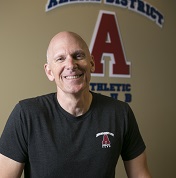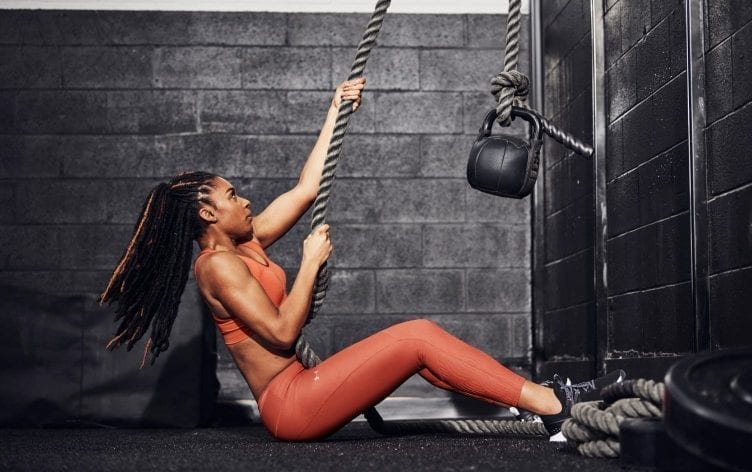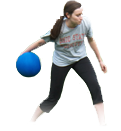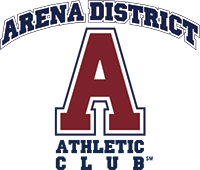
3 Reasons Your Muscles Shake During a Tough Workout

We’ve all felt it at one time or another: That trembling, shaky feeling in your muscles when your workout gets tough, or you’ve been holding a pose (like a plank) for too long.
Why do our muscles shake? And should we be worried when it happens?
We’ll come to the first question in a moment, but to answer the second question, muscle shakes during exercise aren’t something you need to worry about — unless it persists outside of the gym. “If a client said [muscle shakiness] was happening when they’re not working out, I would send them to their doctor,” says Christopher Gagliardi, certified strength and conditioning specialist, ACE-certified personal trainer and ACE resource center manager.
But if your shakes are limited to your workout sessions, rest assured there are three common — and perfectly normal — causes for them.

One of the most common reasons for muscle shakes is fatigue. To understand how fatigue plays a role, we first need to look at what goes on inside your body when your muscles contract.
Contracting a muscle seems simple on the surface, but there’s actually a lot of activity going on inside your body to make that action possible. Anytime you contract your muscles, your nervous system sends chemical messengers to the target muscle (or muscles) via nerve cells known as motor neurons, which tell the muscle fibers to contract.
But all the muscle fibers in a given muscle or muscle group don’t contract at the same time. Instead, your fibers divvy up the work — some fibers work while the others rest, and then they swap places. “Your body is going to signal or activate the right amount of fibers for what you’re asking those fibers to do. So, the longer you hold a position, there will be a series of fibers that were initially activated that will need to relax, and new fibers will be activated,” Gagliardi explains.
The longer you perform a movement or hold a position, the more fatigued your fibers become, and the less efficient your muscle contractions. The result: shakiness. When this happens, it may be time to scale back the intensity or call it quits.
The good news is, as you get stronger and fitter, your muscle fibers become more fatigue-resistant, and you may not get the shakes as quickly as you did before, Gagliardi says. (Though you may still get the shakes if you push yourself hard enough and your muscles fatigue.) As you get stronger and fitter, your body also becomes more efficient at signaling and activating the right muscle fibers for relaxation and contraction, which can also help reduce muscle shakes by making your muscle movements more coordinated.

Dehydration negatively impacts your exercise performance in many ways, and it doesn’t take much to see the effects. In fact, losing as little as 1–2% of your body mass via sweat can reduce your exercise capacity, according to a study in the Journal of Athletic Training.
When it comes to your muscles, dehydration slows the flow of blood, and it’s your blood that’s responsible for transporting key nutrients (like electrolytes) to your working muscles, Gagliardi says. When your muscles don’t receive adequate blood flow or nutrients, they can’t work as efficiently, making them more prone to quakes.
To prevent dehydration-induced muscle shakes, aim to drink 11–13 8-ounce glasses of water per day, as recommended by the Institute of Medicine of the National Academies, and be sure to sip water during exercise — especially if you’re working out in the heat.

According to Gagliardi, muscles may simply shake when they’re learning a new movement pattern. Remember those nerve cells that communicate with your muscles and tell them when to contract? Well, your body learns how to send those signals at the right time and to the right place through repetition. “Your body has to learn the right pathway of communication to support that movement,” Gagliardi explains.
For example, if you’re performing jumping jacks or pushups and your muscles aren’t familiar with those movements just yet, you may feel shaky and uncoordinated at first. But as you practice those movements more and more, your body becomes more efficient at sending and receiving signals, and the shakiness eventually stops.
The Arena District Athletic Club is more than just a gym, it’s a premier fitness facility located in the heart of the Arena District in downtown Columbus. We provide convenience and quality, featuring top-of-the-line equipment, top-notch personal trainers, spa-like locker rooms and a wide variety of free group fitness classes daily including Cardio, Spinning, Barre Fusion, Yoga, Boot Camp and more. We offer free 2-hour parking and convenient contract-free memberships, to fit your healthy lifestyle needs. Don’t just join, belong.




